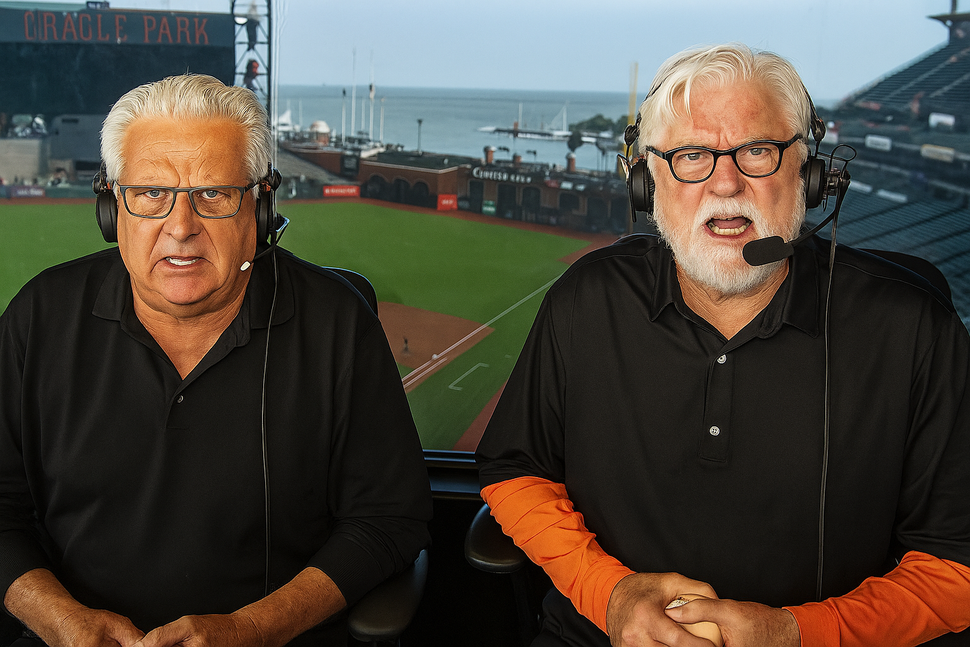By Mauricio Segura August 21, 2025

Photo: GBT Graphics
For decades, Mike Krukow and Duane Kuiper have been the soundtrack of San Francisco summers. Their voices have carried Giants fans through Barry Bonds’ home run chase, the parade routes of three championships, and countless midsummer evenings at Oracle Park. But this August, those familiar tones have taken on a sharp new edge. The usually affable duo now sound more like exasperated uncles at a family barbecue, fed up with watching a once-proud ballclub wander aimlessly in circles.
This is not just a matter of announcers grumbling about a bad night’s box score. When Kruk and Kuip sigh audibly at yet another error, or remark dryly that “the fans deserve better than this,” they are speaking for a city that has grown restless. The Giants have not only stumbled through another August swoon; they’ve looked lifeless doing it. Their home field, once an advantage, has turned into a theater for boos, with fans venting at a club that feels both mismanaged and uninspired.
The broadcast booth has always been a barometer of mood. In past losing seasons, Krukow in particular leaned into humor, spinning bad baseball into lighthearted anecdotes. Now, even the jokes come with a sting. Sarcastic asides about poor defense or wasted scoring chances land differently because they are soaked in the disappointment of a season unraveling in real time. Kuiper, the steadier of the two, has sounded flat, at times resigned, as if struggling to muster the energy to disguise what every viewer can plainly see: the Giants are running on fumes.
Their tone is not an accident. Broadcasters of their stature know exactly how their words ripple. When Krukow openly questions the effort or points out a lack of energy, it resonates because he’s not just a commentator, he’s a franchise pillar who has lived through every shade of orange and black. Fans trust him, and when his voice cracks with frustration, it validates theirs.
What makes this shift more striking is the timing. The Giants entered this season touting a mix of young talent and veteran stability, with Buster Posey steering the front office and Bob Melvin hired as the steady hand in the dugout. But the moves have not translated into wins. Recent trades, including the departures of key bullpen arms, were supposed to reset the roster for the future. Instead, the immediate product has been a club that looks undermanned and overwhelmed, leaving the broadcast crew to describe a team that has lost its way.
This isn’t the first time announcers have mirrored the discontent of their audience. In the late 1970s, Lon Simmons grew famously sardonic during lean years, and in Oakland, Bill King never hesitated to torch ownership when the A’s cut corners. But Kruk and Kuip have built their reputation on warmth, loyalty, and genuine affection for the Giants. For them to sound “over it” marks a serious turn.
There’s also a cultural weight here. Giants fans aren’t just upset about losing baseball. They are worried about irrelevance. Across the Bay, the Athletics are already gone, leaving Sacramento to absorb their story. In Los Angeles, the Dodgers remain a powerhouse with national attention. For San Francisco to fall flat in this moment—when their rivals soar and their neighbors relocate, feels like a deeper wound. The broadcasters’ weary voices only underline that fear.
What happens next depends on leadership. Posey, now the public face of the front office, must decide if the franchise will accept mediocrity or confront it head on. Melvin’s seat grows hotter by the day, and speculation about offseason shake-ups swirls louder with each listless game. Fans don’t need official statements to know the truth; they can hear it in the booth.
Krukow and Kuiper are not merely calling games. They are chronicling a mood, giving voice to a collective frustration that no press release could capture. Their sighs, their sharp words, their rare lapses into silence, these are the true commentary on where the Giants stand. The broadcasts have become as revealing as the stat sheets, a candid audio diary of a team in free fall.
If there is a silver lining, it is that fans and broadcasters alike are still engaged enough to care. Disappointment only stings when there was real hope to begin with. The Giants’ challenge now is to prove worthy of that loyalty, to give Kruk and Kuip something more than exasperation to describe. Until then, the most honest assessment of this season won’t come from the scoreboard or the standings, but from the weary voices that narrate it.















